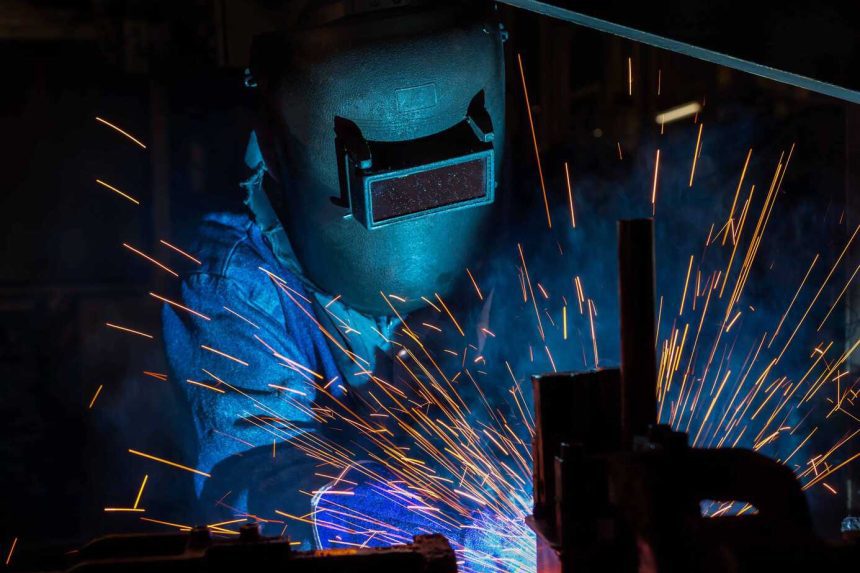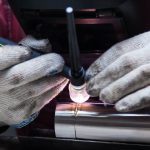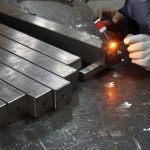Are you interested in welding? Do you want to become a welding pro? If so, mastering the basics of welding electrodes is a critical first step.
Learn the basics of welding electrodes and become a pro welder today!
021208.com
Welding is an essential skill that has revolutionized the manufacturing industry, encompassing everything from home repairs to high-tech aerospace creations. Welding helps bond two or more metals, creating a permanent connection that has a unique strength.
It’s no surprise, therefore, that welding is a widespread trade that many people want to master. If you wish to build a MIG welder or increase your welding proficiency, understanding the basics of welding electrodes is crucial for success.
1) Types of welding electrodes available
If you want to enhance your welding skills, mastering the basics of welding electrodes is a crucial starting point. Welding electrodes are essential consumables in welding that deliver electricity to melt and fuse two metal pieces. Understanding the different types of welding electrodes is vital when deciding which one to use for specific welding tasks.
The common types of electrodes include stick electrodes, MIG electrodes, TIG electrodes, and flux-cored electrodes. Each electrode type has unique attributes that make it suitable for a particular application. Stick electrodes, for instance, are widely used in welding vertical and overhead surfaces, while MIG electrodes are well suited for thicker metal sections.
Learning about each welding electrode type’s properties and applications is critical in becoming a welding pro. It will enable you to make informed decisions on the type of welding electrode to use for different welding situations, producing high-quality welding results.
2) Identify the correct electrode for the material you are welding
To become a welding pro, it is essential to master the basics of welding electrodes. One key aspect of welding electrodes is identifying the correct electrode for the material you are welding.
Different electrodes are specifically designed for certain types of materials, and using the wrong electrode can result in a weak or faulty weld. Before beginning any welding project, it is essential to research and chooses the appropriate electrode for the job.
This involves considering factors like the type of material being welded, the welding machine used, and the specific welding technique employed. Selecting and correctly using the correct electrode is crucial in achieving high-quality, long-lasting welds.
Get started on your journey to becoming a welding pro today! Master the basics of welding electrodes and elevate your skills.
Master the art of welding with our easy-to-follow guide. Boost your skills and knowledge.
021208.com
3) Choose the appropriate electrode diameter for the job
As a welding professional, selecting the correct welding electrode diameter for each job is critical. The diameter of the electrode you choose will impact the type of weld you produce and the amount of time it will take to complete the project.
Thin electrodes with a smaller diameter can be challenging for beginner welders but can also produce lower heat levels, making them ideal for thinner metals. Larger diameter electrodes, on the other hand, have higher levels of heat, which is suitable for welding thick metals.
However, it’s essential to remember that larger diameter electrodes require more time to complete a job and may produce more spatter, leading to additional cleanup time. Continually assess the thickness of the metal you are welding and select the appropriate electrode diameter to ensure a solid and clean weld.
4) Prepare the welding surface properly to ensure a strong bond
Preparing the welding surface is essential to achieving a solid bond in your welding project. This is because the cleanliness and quality of the welding surface determine the success of the overall welding venture.
The surface area must be rigorously scrubbed and degreased to ensure that no foreign particles are present that could negatively impact the visual and mechanical functionality of the joint.
Undertaking this process correctly will help to ensure that the welding electrode can be applied effectively and that the final product meets your performance and aesthetic expectations.
Therefore, be sure to dedicate sufficient time to properly prepare the welding surface and avoid taking shortcuts that could jeopardize the overall success of the welding project.
5) Use correct welding techniques, including maintaining a consistent arc length
To become a welding professional, it is essential to master the basics of using welding electrodes effectively. One crucial aspect of this is to use the correct welding techniques. Maintaining a consistent arc length is a critical component of producing quality welds.
Welding with varying arc lengths can lead to issues such as porosity, shallow penetration, and weld bead inconsistency. By maintaining a consistent arc length, welders can ensure their welds are of the highest quality.
6) Control amperage and voltage to avoid overheating or underheating the weld
One of the essential skills every welding pro should master is the control of amperage and voltage to prevent overheating or underheating of the weld.
Overheating can result in a weakened weld, while underheating can lead to a lack of penetration, making the joint vulnerable to breaking. Understanding the relationship between voltage and amperage and how to adjust them to achieve the desired results is crucial.
Determining how to regulate the heat input by manipulating the current and voltage settings is critical to producing robust, reliable, long-lasting welds. As a welding pro, you must ensure that you can skillfully control the heat input and prevent any welding defects that could compromise your work’s quality and safety.
7) Monitor and adjust your welding settings as needed
To become a successful welding pro, it is essential to monitor and adjust your welding settings as needed. Welding involves working with materials that can produce different outcomes depending on the welding technique and settings.
Changing welding settings to suit other materials and environments can result in better-quality, structurally strong welds and may lead to equipment failure or workplace accidents.
Therefore, it is crucial to carefully monitor the welding process and adjust settings as needed to ensure the final product meets industry standards and adheres to project specifications.
By taking the time to understand how different settings affect the welding process, you can improve your welding skills and become a master of welding electrodes.
8) Practice and gain experience to master the art of welding and become a pro
To become a welding pro, committing to learning and mastering the art of welding is essential. This regularly involves practicing welding electrodes, understanding the differences between different types of electrodes, and gaining experience through real-world welding projects.
It is necessary to seek guidance and mentorship from experienced welders and take advantage of opportunities for professional development and training. Through consistent effort and a dedication to improving your technique, you can become confident in your welding abilities and develop the skills and knowledge necessary to take on complex and challenging welding projects.
Remember, mastery of welding requires both technical expertise and practical experience, so commit to continuous learning and improvement to excel in this field.
Verdict
To sum up, learning the basics of welding electrodes is essential to becoming a welding pro. Understanding how different types of electrodes work and which ones to use for various welding applications can take your skills to the next level.
By mastering the basics of welding electrodes, you can create solid, durable welds that stand the test of time. With practice, patience, and a commitment to safety, you can become a master welder and confidently take on even the most challenging welding projects.











